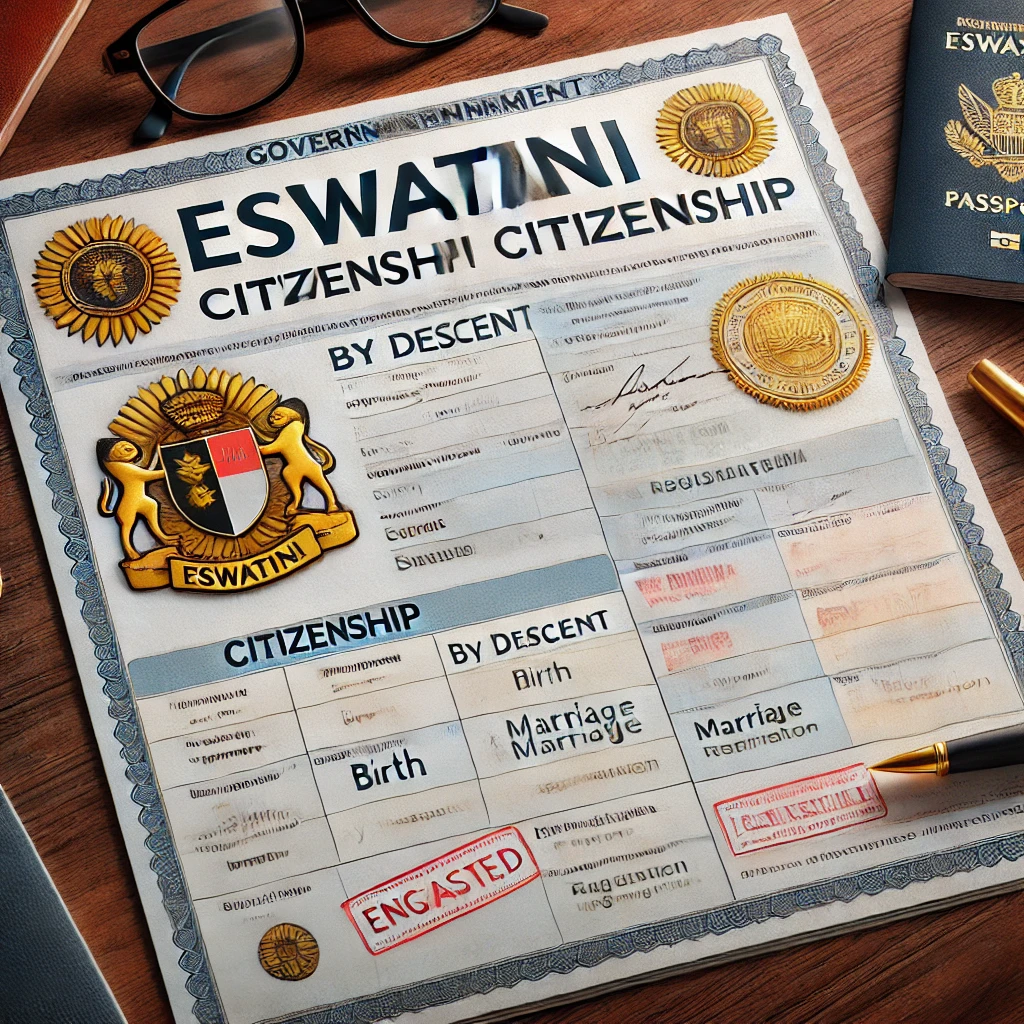How to Get Eswatini Citizenship
Eswatini citizenship can be acquired through various avenues, including descent, birth, marriage, registration, or traditional integration. Below is a comprehensive guide detailing each pathway:
1. Citizenship by Descent
Individuals born, whether before or after the commencement of the Eswatini Constitution, and whether inside or outside of Eswatini, are citizens by descent if they are descendants of Eswatini citizens.
2. Citizenship by Birth
- Born in Eswatini: A person born in Eswatini after the commencement of the Constitution is a citizen by birth if, at the time of birth, the father was a citizen of Eswatini.
- Born Outside Eswatini: A person born outside Eswatini after the commencement of the Constitution is a citizen if, at the time of birth, the father was a citizen of Eswatini. However, suppose both the individual and their father were born outside Eswatini. In that case, the individual must, within one year after attaining the age of majority, notify the Citizenship Board in writing of the desire to retain Eswatini citizenship.
- Children Born Outside of Marriage: If a child is born outside of marriage and is not adopted or claimed by the father according to Swazi law and custom, but the mother is a citizen of Eswatini, the child is considered a citizen by birth.
- Adopted Children: A child legally adopted by an Eswatini citizen is deemed a citizen by birth.
3. Citizenship by Marriage
A woman married to an Eswatini citizen can acquire citizenship by:
- Lodging a declaration in the prescribed manner with the Minister responsible for citizenship, any Diplomatic Mission or Consular Office of Eswatini, or any other prescribed office.
- This declaration can be made before or at any time during the marriage.
- Upon lodging the declaration, the woman becomes a citizen from the date of marriage (if declared before marriage) or from the date of lodgment (if declared after marriage).
4. Citizenship by Registration
Individuals may acquire citizenship by registration if they meet the following conditions:
- Residency: Ordinarily and lawfully resident in Eswatini for a continuous period of at least 12 months immediately preceding the application and for periods amounting to not less than five years in the seven years preceding the application.
- Character: Of good character.
- Language Proficiency: Adequate knowledge of siSwati or English.
- Intent to Reside: Intends to reside in Eswatini upon being granted citizenship.
- Financial Means: Has adequate means of support while in Eswatini.
- Contribution to Development: Has contributed and will continue to contribute to the development of the country.
Alternatively, a person who has been ordinarily resident in Eswatini for at least ten years and has the support of a Chief (after consultation with the chief’s council) or three reputable citizens may also be eligible for registration.
5. Citizenship by Khonta (Traditional Integration)
Under traditional law and customary practice, known as “khonta,” individuals accepted into a chiefdom are granted land to build and farm. This acceptance, formalised through a certificate authorised by the King, grants nationality without the need for formal registration or naturalization.
Application Process
Applications for citizenship are managed by the Citizenship Secretariat under the Chief Immigration Officer. The process involves:
- Submission of Application: Complete the relevant application form and submit it along with the required documents, including fingerprints, photographs, and supporting letters.
- Payment of Fees: A pre-application fee is required, varying based on the application class (e.g., E500 for applicants above 21 years).
- Review by Citizenship Board: The Citizenship Board evaluates applications, grants or refuses citizenship by registration, and advises the Minister on citizenship matters.
Important Considerations
- Dual Citizenship: Eswatini’s stance on dual citizenship is restrictive. Individuals acquiring another nationality may be required to renounce Eswatini citizenship.
- Oath of Allegiance: Successful applicants must take an oath or affirmation of allegiance as prescribed.
For detailed information and guidance, it is advisable to consult the Eswatini Citizenship Act and the Constitution of the Kingdom of Eswatini, 2005.
Please note that immigration laws can change. It is recommended to consult official government sources or legal experts for the most current information.

